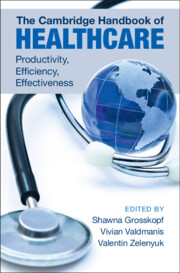Book contents
- Frontmatter
- Contents
- Boxes
- Contributors
- Introduction and Overview
- 1 Overview of Performance Analytics for Healthcare with Examples in R
- 2 Cost-Effectiveness Analysis for Healthcare: From Theory to Practice to Problems and Solutions
- 3 Capabilities, QALYs, and COVID
- 4 The Economic Efficiency of Policies to Reduce Ill Health Involving Environmental Factors
- 5 Health in the National Accounts
- 6 Healthcare as Social Infrastructure: Productivity and the UK National Health Service During and After COVID-19
- 7 Health, Human Capital, and Its Contribution to Economic Growth
- 8 What Do We Know from the Vast Literature on Efficiency and Productivity in Healthcare? A Review and Bibliometric Analysis
- 9 Brief Overview of Production Theory for Analyzing Healthcare Performance
- 10 Modeling Production of Well-Being from an Intermediate Medical Intervention: With an Empirical Demonstration
- 11 Data Envelopment Analysis Applications and US Hospital Policy
- 12 New Tools for Evaluating the Performance of Healthcare Providers Using DEA and FDH Estimators
- 13 Stochastic Frontier Analysis for Healthcare, with Illustrations in R
- 14 A Review of US Stochastic Frontier Studies of Hospital Efficiency Published After 2008
- 15 A Nonparametric Journey through Conditional Frontier Models
- 16 Measuring Health and Healthcare Efficiency: Revised Guidelines for Measurement
- 17 A Brief Introduction to Causal Inference in Healthcare
- 18 Dynamic Assignment of Patients to Primary and Secondary Inpatient Units: Is Patience a Virtue?
- Index
15 - A Nonparametric Journey through Conditional Frontier Models
Published online by Cambridge University Press: 21 November 2024
- Frontmatter
- Contents
- Boxes
- Contributors
- Introduction and Overview
- 1 Overview of Performance Analytics for Healthcare with Examples in R
- 2 Cost-Effectiveness Analysis for Healthcare: From Theory to Practice to Problems and Solutions
- 3 Capabilities, QALYs, and COVID
- 4 The Economic Efficiency of Policies to Reduce Ill Health Involving Environmental Factors
- 5 Health in the National Accounts
- 6 Healthcare as Social Infrastructure: Productivity and the UK National Health Service During and After COVID-19
- 7 Health, Human Capital, and Its Contribution to Economic Growth
- 8 What Do We Know from the Vast Literature on Efficiency and Productivity in Healthcare? A Review and Bibliometric Analysis
- 9 Brief Overview of Production Theory for Analyzing Healthcare Performance
- 10 Modeling Production of Well-Being from an Intermediate Medical Intervention: With an Empirical Demonstration
- 11 Data Envelopment Analysis Applications and US Hospital Policy
- 12 New Tools for Evaluating the Performance of Healthcare Providers Using DEA and FDH Estimators
- 13 Stochastic Frontier Analysis for Healthcare, with Illustrations in R
- 14 A Review of US Stochastic Frontier Studies of Hospital Efficiency Published After 2008
- 15 A Nonparametric Journey through Conditional Frontier Models
- 16 Measuring Health and Healthcare Efficiency: Revised Guidelines for Measurement
- 17 A Brief Introduction to Causal Inference in Healthcare
- 18 Dynamic Assignment of Patients to Primary and Secondary Inpatient Units: Is Patience a Virtue?
- Index
Summary
Conditional frontier models, including full and partial, robust frontiers, have evolved into an indispensable tool for exploring the impact of exogenous factors on the performance of the decision-making units in a fully nonparametric setup. Nonparametric conditional frontier models enable the handling of heterogeneity in a formal way, allowing explanation of the differences in the efficiency levels achieved by units operating under different external or environmental conditions. A thorough analysis of both full and robust time dependent conditional efficiency measures and of their corresponding estimators allows unravelling the compounded impact that exogenous factors may have on the production process. The nonparametric framework does not make assumptions on error distributions and production function forms and avoids misspecification problems when the data-generation process is unknown, as is common in applied studies. This chapter proposes a comprehensive review and journey through the conditional nonparametric frontier models developed so far in the efficiency literature. The authors show how this nonparametric dynamic framework is important for evaluating efficiency in the healthcare sector. They provide numerical illustrations on datasets from the Italian healthcare system, including summaries of practical implementation details.
Keywords
- Type
- Chapter
- Information
- The Cambridge Handbook of HealthcareProductivity, Efficiency, Effectiveness, pp. 493 - 544Publisher: Cambridge University PressPrint publication year: 2024

